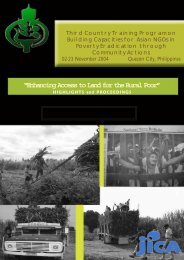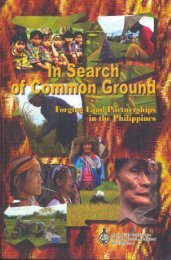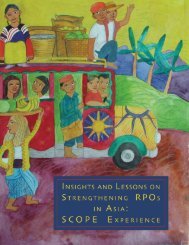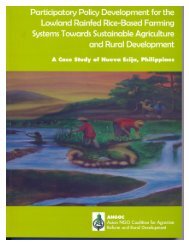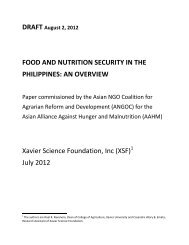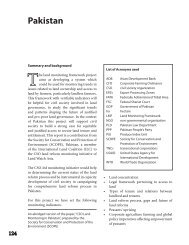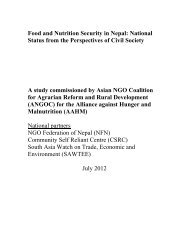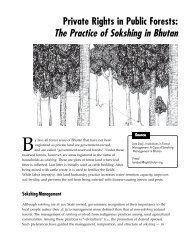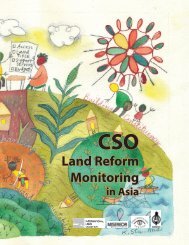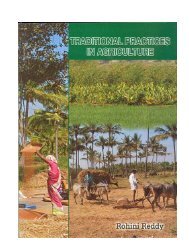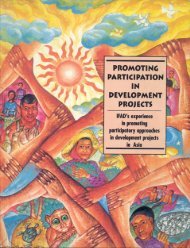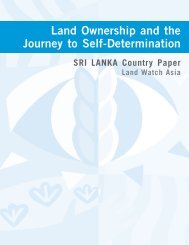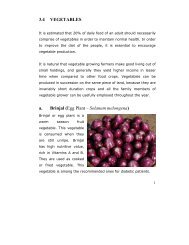Securing the Right to Land FULL - ANGOC
Securing the Right to Land FULL - ANGOC
Securing the Right to Land FULL - ANGOC
You also want an ePaper? Increase the reach of your titles
YUMPU automatically turns print PDFs into web optimized ePapers that Google loves.
<strong>Land</strong> Watch Asia<br />
Campaign<br />
Declaration<br />
Our Alliance<br />
The <strong>Land</strong> Watch Asia Campaign comprises 17 Social Movements<br />
and Civil Society Organizations (CSOs) from Bangladesh, Cam-<br />
bodia, India, Indonesia, Nepal and <strong>the</strong> Philippines, which work<br />
<strong>to</strong> increase access <strong>to</strong> land of poor women and men in <strong>the</strong> rural<br />
areas and <strong>to</strong> empower <strong>the</strong>se communities <strong>to</strong> realize <strong>the</strong>ir own<br />
development.<br />
Our Urgent Concerns<br />
Asia has 75% of <strong>the</strong> world’s farming households, 80% of whom<br />
are resource poor small-scale farmers and producers. Yet, <strong>to</strong>day,<br />
<strong>the</strong> region accounts for 505 million hungry people or two-thirds<br />
of <strong>the</strong> 800 million severely undernourished people in <strong>the</strong> world.<br />
The majority of Asia’s rural poor are landless or lack access <strong>to</strong><br />
productive land. These landless poor are marginalized farmers<br />
and tenants, adivasis or indigenous peoples, women, dalits and<br />
minority castes, pas<strong>to</strong>ralists and herders, fisherfolk, and internally-displaced<br />
persons.<br />
For nearly two decades, small farmers and producers in Asia<br />
have been heavily affected by <strong>the</strong> adverse impact of trade liberalization<br />
policies that skewed commodity prices, escalated<br />
acquisition of productive lands by commercial interests, and<br />
privatized common property resources (i.e., forests, minerals,<br />
water, etc.).<br />
Growth-led and market-driven policies that neglect smallholder<br />
agriculture and land rights of <strong>the</strong> poor, have been promoted by<br />
governments and multilateral organizations, leading <strong>to</strong> food insecurity,<br />
loss of livelihoods, rising social tensions, and degradation<br />
of natural resources. In many cases, competition for land<br />
has erupted in<strong>to</strong> open conflict between sec<strong>to</strong>rs and communities,<br />
causing insecurity and socio-political instability.<br />
Many governments still need <strong>to</strong> deliver on <strong>the</strong>ir past land reform<br />
programs and targets. Meanwhile, market-assisted land reform<br />
(MALR), under <strong>the</strong> principle of “willing buyer, willing seller” has<br />
not been effective in redistributing land in favor of <strong>the</strong> poor,<br />
who cannot afford high land prices. Also, in a number of Asian<br />
THE PROLONGED STRUGGLE FOR LAND RIGHTS IN ASIA<br />
35<br />
countries, “land administration” projects are conducted <strong>to</strong> ensure<br />
a more efficient titling system. While important, such<br />
projects run <strong>the</strong> risk of “legitimizing” his<strong>to</strong>rical injustices, including<br />
land grabbing and eviction of tenants and occupants.<br />
The global food crisis has renewed attention <strong>to</strong> <strong>the</strong> disastrous<br />
effects of continued land conversion favoring commercial and<br />
industrial interests (e.g., large plantations, golf courses, mining,<br />
special economic zones, real estate speculation) as well as <strong>the</strong><br />
declining investments for agriculture. Rising fuel prices have<br />
increased competition for land and diverted raw materials<br />
(wheat, soybean, maize, sugarcane, and palm oil) for bio-fuel<br />
production, <strong>to</strong> <strong>the</strong> disadvantage of poor farmers and consumers.<br />
Our Common Conviction<br />
Agrarian reform and land tenure security should be an integral<br />
part of national development strategies. Sustained food selfsufficiency<br />
and development in rural Asia will only be achieved<br />
with more equitable land redistribution, <strong>to</strong>ge<strong>the</strong>r with support<br />
services, sustainable resource management and community<br />
empowerment.<br />
Food self-sufficiency requires access <strong>to</strong> land by small food producers.<br />
Studies show that smallholder farms have greater yield<br />
per hectare than large farms due <strong>to</strong> greater labor intensity, more<br />
efficient use of land and inputs, and greater incentive for enhancing<br />
farm productivity and practicing conservation and sustainable<br />
management. O<strong>the</strong>r studies also confirm that access <strong>to</strong><br />
land is linked <strong>to</strong> better food sufficiency, improved health and<br />
<strong>the</strong> overall well-being of farming households.<br />
<strong>Land</strong> is more than an economic asset or commodity. Access <strong>to</strong><br />
land not only brings a source of survival but also increases<br />
one’s sense of human dignity and security and <strong>the</strong> opportunity<br />
<strong>to</strong> break out of poverty. More equitable access <strong>to</strong> land reduces<br />
resource conflicts and rural outmigration, and improves overall<br />
peace for greater economic and political stability.<br />
Our Common Action<br />
Given this backdrop, <strong>the</strong> <strong>Land</strong> Watch Asia (LWA) campaign from<br />
July 2008 <strong>to</strong> July 2011 commits itself <strong>to</strong> advance <strong>the</strong> land<br />
rights of farmers, indigenous peoples, women, forest dwellers,<br />
fisherfolk, pas<strong>to</strong>ralists, dalits and o<strong>the</strong>r impoverished sec<strong>to</strong>rs in<br />
<strong>the</strong> rural areas by:<br />
Protecting and promoting <strong>the</strong> gains of progressive legislation<br />
and initiatives on access <strong>to</strong> land;<br />
ASIAN NGO COALITION FOR AGRARIAN REFORM AND RURAL DEVELOPMENT



